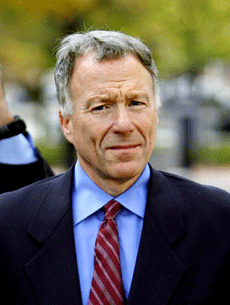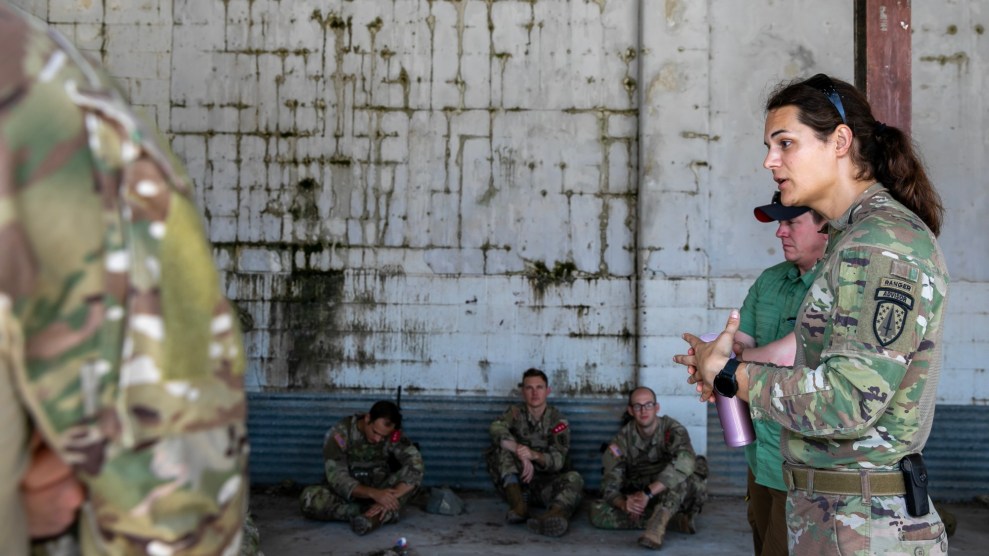
After a month of testimony, which at times offered an inside glimpse of the Bush administration as its case for invading Iraq began to unravel, a jury will now decide the fate of I. Lewis “Scooter” Libby Jr. Jurors will have to choose between the competing narratives offered by the prosecution and the defense, deliberating on whether the vice president’s former chief of staff invented an elaborate cover story to mask his involvement in the outing of CIA officer Valerie Plame, or, alternately, misremembered details of his conversations with reporters and government officials during June and July 2003. Is this “a case about lying,” as prosecutor Peter Zeidenberg argued yesterday, making his closing argument? Or is it, as defense lawyer Ted Wells told the jury with trademark flourish, a case about “he-said-she-said,” one “about different recollections between Mr. Libby and some reporters”?
His voice rising to fill Judge Reggie Walton’s packed court room, Wells reminded the jurors of the grave importance of their charge, noting that they, as well as Libby, will have to live with the verdict they hand down. “The stakes are a man’s reputation, a man’s life,” he said. Indeed, if Libby is convicted on each of the five counts he’s charged with—two apiece of perjury and making false statements and one of obstruction of justice—he could face a prison sentence of up to 30 years and a fine of $1.25 million.
In determining Libby’s guilt or innocence, the jury will be left to sift through a complex timeline of events and weigh Libby’s credibility against that of prosecution witnesses. Led by Patrick Fitzgerald, the prosecution has painted Libby as the loyal foot soldier of the vice president, who, at Dick Cheney’s direction and with single-minded zeal, set about trying to discredit administration critic Joseph Wilson. In the process of digging up information on Wilson’s mission to Niger to investigate whether Iraq had attempted to purchase yellowcake uranium, a claim stated as fact in the president’s State of the Union but disputed by Wilson’s findings, Libby would wind up discovering and later disseminating the covert status of Wilson’s wife, an operative in the very CIA unit that was pursuing evidence of Iraq’s weapons of mass destruction. “She was an argument, a fact to use against Joe Wilson,” Fitzgerald said in his closing remarks. “There was an obsession with Wilson.”
According to the prosecution’s version, Libby knowingly lied to federal investigators and a grand jury, spinning a convoluted tale in an effort to save himself from prosecution and possibly to spare the vice president himself from being implicated in the scandal. Though he acknowledged first learning of Plame’s identity from Cheney in the first weeks of June 2003, he told the grand jury that he’d completely forgotten about Plame a month later, when, on July 10, 2003, he called NBC’s Tim Russert to complain about the coverage of his colleague, Chris Matthews. During that conversation, Libby testified, Russert brought up Plame’s role at the CIA, saying that “all the reporters know it.” He said he recalled being “taken aback” by this “because at that point in time I did not recall that I had ever known, and I thought this is something that he was telling me that I was first learning.” Libby would also testify that when asked about Plame by Time’s Matt Cooper two days later, on July 12, 2003, he replied that “reporters are telling us” about her role in Wilson’s trip; he was careful to add, he said, that he wasn’t even sure whether or not this was true.
To counter Libby’s version, the prosecution produced a series of high-profile witnesses, who, one by one, disputed his account. Arguably the most important of these was Russert, who told the jury in unequivocal terms that it would have been “impossible” for him to disclose Plame’s identity to Libby—he had no idea who she was until four days later, when Robert Novak’s infamous column ran in newspapers across the country, igniting the controversy.
Further undermining Libby’s memory lapse defense was the testimony of eight prosecution witnesses—among them former State Department official Marc Grossman and Ari Fleischer, once the White House spokesman—all of whom said they talked with Libby about Plame in the month leading up to the Novak column. “Add it up,” Zeidenberg said. “Nine conversations about Wilson’s wife with eight people. Mr. Libby claims to remember none of them.”
“Just consider Mr. Libby’s story that he forgot the information he learned from the vice president,” he later told the jury. “It’s ludicrous.”
Where the prosecution’s case was straightforward and concise, Libby’s defense was dense and often circuitous, laced with conspiracy theories that seemed primarily intended to confuse the jury. Producing notes written in the vice president’s hand, which Wells referred to yesterday as “one of the most important pieces of evidence in this case,” the defense suggested early on that Libby had been scapegoated by the White House, which was desperate to protect Karl Rove, the “lifeblood” of the Republican Party and the real culprit in the Plame leak. “Not going to protect one staffer and sacrifice the guy that was asked to stick his head in the meat grinder because of the incompetence of others,” the vice president’s notes read.
Over the course of the trial, the defense also offered a handful of sometimes contradictory theories to explain Libby’s account of his conversation with Russert. At one point, Libby’s lawyers floated the possibility that he had confused Russert with Novak, who, according to the defense, Libby had also spoken with during the week of July 6, 2003. Reversing itself, the defense later raised the possibility that the conversation in question had indeed taken place as Libby remembered it, suggesting that one of Russert’s NBC colleagues, either David Gregory or Andrea Mitchell, had told him about Plame prior to his July 10 conversation with Libby.
Leaving aside, for the most part, the more conspiratorial strains of its narrative yesterday, the defense zeroed in on the core of its case, stressing, as it has done throughout the trial, that a senior official like Libby, who worked 14-hour days and six-day weeks and regularly dealt with the country’s most pressing national security concerns, could hardly be expected to recall with accuracy the details of his day-to-day conversations. Libby was “bombarded by a blizzard of information” daily, Wells said, painting the picture of an administration in crisis. In the summer of 2003, with Iraq’s weapons of mass destruction yet to be found and the case for war coming under intense scrutiny, “the wheels” were “falling off the Bush administration,” Wells said. “It was a crazy period. And now they’re saying what do you remember about Valerie Wilson.” Wells then acknowledged that Libby “made a lot of mistakes” during his appearances before the grand jury and said that he was “confused about a lot of things” during his testimony. But, he said, the prosecution’s witnesses were guilty of memory lapses too. “There were memory problems with every witness.”
Nearing the end of his closing statement, Wells, channeling the charisma of a Baptist preacher, paced the courtroom, his voice rising to a shout one moment and a whisper the next. “I say to you don’t in this case sacrifice Scooter Libby for how you may feel about the war in Iraq, or how you feel about the Bush administration,” he said. “Don’t sacrifice Scooter Libby.”
“For the past month he’s been under my protection,” Wells continued, telling the jury that they were now entrusted with Libby’s fate. “Just give him back to me,” he implored, starting to sob. “Just give him back to me.”
















